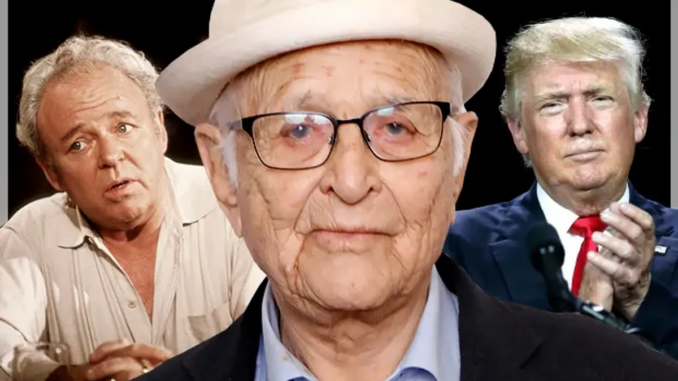
Norman Lear sits down with Salon: “Trump is the middle finger of the American right hand”
Archie Bunker wouldn’t vote for Trump, insists his 93-year-old creator, now the subject of an irresistible film.
Norman Lear tells the mother of all Jewish-mother anecdotes, and it bears repeating in print even though it’s certainly funnier in person. When the Television Hall of Fame was first established in 1980, the creator of “All in the Family” and “Maude” and “The Jeffersons” and “Mary Hartman, Mary Hartman” was inducted alongside an all-star cast of small-screen luminaries, including Lucille Ball, Milton Berle and Edward R. Murrow. Lear called his elderly mother to tell her of this honor, and there was a long silence at the other end of the line. “Well,” she finally said, “if they want to do that, who am I to say?”
Lear, who will turn 94 later this month — “If I make it that far,” he will certainly add — tells great stories. But the remarkable thing about meeting the living legend who revolutionized television comedy is not that he talks but that he listens. During our hour-long conversation in a noisy restaurant in lower Manhattan, Lear arrived about an observation about the central role of Jewish humor in American comedy that he said he’d never had before. He asked questions about my family and my background and guessed my age exactly (which was a little terrifying). He walks slowly and is somewhat hard of hearing, and has none of the veneer of artificial youth you often find in Hollywood, but seems more engaged with other people and the world than many people three decades younger.
There’s a scene in Heidi Ewing and Rachel Grady’s richly entertaining documentary “Norman Lear: Just Another Version of You” where we see Lear, backstage at “Good Morning America,” shoveling crumbs of his snack under the green-room table with his feet. Watching the movie a second time, I wondered what it was doing there. Then I read through the transcript of this interview and concluded that was the nine-year-old boy at work, the one Lear says is always present in him — a boy who is careful and who notices the details, who addresses serious issues with humor and sees the universality of human foibles.

Even if you’re too young to have grown up with Archie and Edith Bunker or George and Weezy Jefferson or the other flawed American families in Lear’s shows, you still live in the media universe he made possible. “All in the Family” was the first must-see sitcom, whose weekly ideological clashes between Archie the right-wing bigot (played with enormous sensitivity by Carroll O’Connor) and his son-in-law Mike (Rob Reiner) distilled the cultural divide of the Nixon years. If “Sanford and Son” and “Good Times” and “The Jeffersons” were not quite the first sitcoms to feature African-Americans, they sought to do with far more specificity and complexity than ever before. Bea Arthur’s title character in “Maude,” most famous, chose to have an abortion in a 1972 episode, two months before the Supreme Court’s Roe v. Wade decided.
Lear’s shows, which galvanized public opinion and attracted huge audiences (mostly on CBS, then identified as a liberal-leaning network), would not quite be possible now, in an age of niche marketing and narrowcasting when everyone consumes media within his or her self -constructed sphere. An abortion storyline featuring the main character on a major broadcast network show is still infrequent enough to cause a stir, and perhaps no network, period, would be OK with a white showrunner at the helm of several different series about black families.
But as comes through clearly in Ewing and Grady’s subtle, rewarding and necessary film (they are the Oscar-nominated documentary duo behind “Jesus Camp” and “Detropia”), all the cultural divisions that Lear’s shows brought to the fore in the 1970s — on race and gender and sexuality and national identity — remains with us today, perhaps even more strongly. As the film’s title suggests, Lear has always been guided by his faith in communication and human commonality, qualities that seem in short supply at the moment.
Everyone asks Lear about Archie Bunker and Donald Trump, and I did too. He sees the relationship, of course, but insists that Archie, once alone with his own thoughts and his own conscience, wouldn’t have it in him to vote for Trump. We have to hope he’s right.
Norman, my mother is exactly your age, so I promise not to show you any respect! [Laughter.] Seriously, though — although she’s physically frail she has that thing you have, that George Clooney talks about in the movie: an ability not to be bored by life and not to be bored by other people. What is it about so many people your age, or even younger, that makes them shut down?
I see them shutting down at 60. I can’t believe how old some people are at 60. I don’t know what it is. I think a lot has to do with the nature of the culture. We don’t honor the end of life at all.
